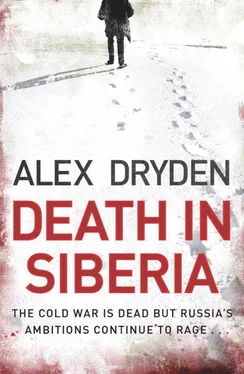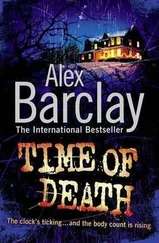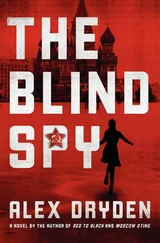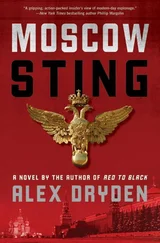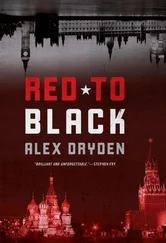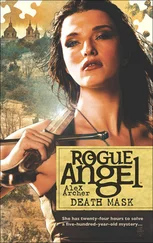He fired burst after burst, until the magazine was empty.
He heard the engine of his boat in his left ear and saw through the corner of his eye that it was racing around the promontory, heading for the beach, until a burst of fire erupted from the patrol boat. And then it switched direction towards the patrol boat and he saw the grey curve of a grenade, launched from the shoulder of the twenty year old in the bow. It burst on to the deck, accurate to the millimetre, from a boat that was smashing into the water at forty knots.
Larry ran down the other side of the ridge, unarmed now, and ran and ran along the ice beach for four hundred yards until he stood over the scene of carnage that now spread out from the glowing wood where the fish that nobody would eat still cooked. He ran to the figure in red and turned it over and saw Anna’s face. There was blood on her mouth. He flung the coat back and saw more blood on her stomach.
He stood and shouted, screamed at the boat out in the bay, for assistance, and saw it turn, sure now there was nobody left on board the patrol boat. It beached yards away and Larry screamed again, this time for the medic, who ran up the ice slope of the beach and knelt beside the red-coated figure, felt her pulse, looked at Larry.
‘I don’t know,’ he said.
‘Is she alive?’ Larry shouted at him.
‘Yes, she’s alive. But only just.’
‘Fix her, for Christ’s sake, fix her, goddammit, fix her.’
The medic ran back down the beach to fetch a heavy titanium case. He struggled back up across the stones until he knelt beside Anna. He opened the case and took out a defibrillator. He tore the clothes away from her upper body and attached the wires to her chest. Then he pressed the red button. Larry watched as her back arched and she seemed to leap up from the stones, only to settle back lifelessly. The medic pressed the button again and her body arched once more in a terrible spasm that lifted her and dropped her again.
Larry turned and ran to the edge of the water. He shouted at the others in the boat to sink the patrol boat. It must not be seen by prying spotter planes or helicopters. They had a ten-hour journey ahead at seventy knots, back to Finland, and he wanted nothing suspicious that would lead to the evidence of the massacre on the beach.
He ran back up the icy stones to Anna, at some point hearing a dull thud of explosives out to sea.
The medic was kneeling beside Anna, pressing the red button – her body grotesquely reacting to the charge – pumping her heart, attaching a drip, stemming the flow of blood that ran from the wound in her stomach with thick anti-sceptic wadding, injecting her, putting his mouth to hers and all the time keeping on pressing down on her heart with great thumps and breathing deeply into her mouth with his.
Larry was crying, he realised.
‘Save her. Just save her,’ he said, but quietly, desperately, despairingly now.
And then, through the tears that he felt coursing down his cheeks, he saw something shine from a deerskin jacket she’d been wearing beneath the red coat.
He knelt and slipped his hand inside the jacket and withdrew a plastic package – the shiny glint he’d seen. He saw the plastic was waterproofing. And as he gripped it in his trembling hands, his grief almost overwhelming him, he knew that, somehow, she had done it. He knew that what he was holding in his hands was the end of the old world and the beginning of the new.
Larry put his fingers around her wrist. Nothing. The medic pressed the button again. Larry held on, desperate for a response. He felt a flutter underneath his fingers, a faint, broken pulse. It grew stronger, more regular, and he tightened his fingers on the inside of her wrist in terrified hope. Now her pulse began to beat, then a break, then a return to a steady motion under his fingers. And, at last, Larry knew that she would be part of this new world and would not depart with the old. He wept.
I would like to thank certain people who wish to remain nameless in the city of Norilsk, Russia, the second largest city in the world north of the Arctic Circle. They are the sons and daughters of the slaves who built this dreadful place, where life expectancy is forty-six years. Their generous hospitality and help to me during my visit in the brief period when the Kremlin allowed foreigners to visit the city in the 1990s was invaluable. I would also like to thank those in Russia who are prepared to break ranks with the corrupt regime currently in power there. They are brave people whose wish for democracy, the rule of law and a political system not dominated by the spy elite often invites vilification, gaol and even death. I would like to thank Stephen Horvath, Hungarian-born engineer, inventor and nuclear scientist for his inspiration and genius. My thanks too to AR for his skills in the dark arts. And, as always, my thanks are due to my editor Martin Fletcher and my agent Piers Blofeld.
Alex Dryden worked with MI6 and has specialised in Russian affairs for many years. He is now a writer and journalist. When the Berlin Wall came down in 1989, Dryden was working in the Republic of Georgia. From there he travelled across Central Asia and Russia, meeting former Soviet national leaders and their replacements, KGB officers and senior mafia figures, all the while watching the statues of Lenin fall as the Soviet Union itself collapsed. Since then he has charted the false dawn of democracy in Russia as the country morphed into the world’s most powerful secret state. He wrote his first book Red to Black in ‘sadness and anger at the way the Russian people once more fell under the fist of the new KGB’. Its success has led to three more books charting the rise of Russia’s spy elite and its deadly reach across the globe. Dryden’s inside knowledge of the secret world in this new and growing East-West conflict is brought powerfully to life in his novels Red to Black , soon to be a major movie, Moscow Sting, The Blind Spy and now Death in Siberia .
To find out more, visit the author’s website at www.alexdryden.com.
By Alex Dryden and available from Headline
Red to Black
Moscow Sting
The Blind Spy
Death in Siberia
Praise for Alex Dryden’s novels:
‘Russia expert Alex Dryden avoids the worldly expositions that can dog a novel of ideas. His inspiring geopolitical essay is as organic to the story as it is unsettling’
Telegraph
‘Alex Dryden’s novel could not be better timed… [his] anger with the sinister developments in today’s Russia leaps off the page’
Barry Forshaw,
Daily Express
‘Brilliant and unforgettable’
Stephen Fry
‘The scenes in London’s clubland, where arrogant spymasters down cocktails with braying City bankers, are especially well drawn. The description of Transdniestria brilliantly captures its dusty claustrophobia, corruption and menace’
Economist
‘Dryden sounds a warning to the rest of Europe while telling this thrilling tale. If you like fiction laced with some very believable facts, then Red to Black will be a winner for you’
Edinburgh Evening News

Copyright © 2011 Alex Dryden
The right of Alex Dryden to be identified as the Author of the Work has been asserted by him in accordance with the Copyright, Designs and Patents Act 1988.
Apart from any use permitted under UK copyright law, this publication may only be reproduced, stored, or transmitted, in any form, or by any means, with prior permission in writing of the publishers or, in the case of reprographic production, in accordance with the terms of licences issued by the Copyright Licensing Agency.
Читать дальше
